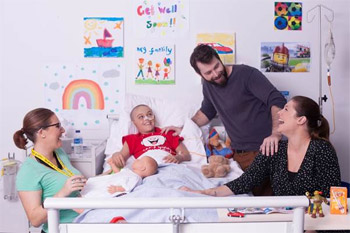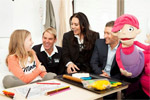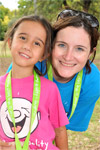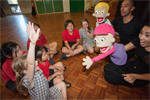Gary Nunn Camp Quality Interview

Gary Nunn Camp Quality Interview
Today, two families will be told the devastating news that their child (aged 0 – 13) has cancer. By the end of the year, the amount of children living with cancer in Australia would fill Sydney Opera House.
Coinciding with Children's Cancer Awareness Month (throughout September), Simon Rountree – Chief Executive of children's cancer charity Camp Quality – states that the 'obsession" with finding a cure for cancer is 'only half of the battle."
Simon Rountree said: 'Medical cancer breakthroughs are crucial. But, with still no cure, the biggest breakthrough lies within us all. It's called resilience."
'In my 14 years as Chief Executive of Camp Quality, this is the one word that defines what we do for families who have a child with cancer. In my job, I meet many families living through a total nightmare. Some say that, until their child was diagnosed, they didn't even realise kids could get cancer. Three quarters of children diagnosed with cancer will survive but, for families living through that uncertain journey now, research and cures can feel out of reach. What they urgently need to just face the next day is resilience – and the mental tools that help with that. Medicine and technology are only half the battle."
'When times seem tough, comparing our struggles to those of a kid with cancer and seeing how they still summon the energy to laugh, is the most poignant lesson of all."
As of February 2014, the World Health Organisation reported that cancer is now the biggest killer in Australia, overtaking heart disease. Cancer is the biggest killer of children from disease in Australia. 10,000 children are either newly diagnosed, under treatment or in remission. The majority of childhood cancer survivors will have one or more chronic health, social or developmental challenges as a result of having intense treatment so young. Doctors predict global cancer rates will increase by three-quarters over the next two decades and they expect 20 million new cases by 2025.
Coinciding with Children's Cancer Awareness month, Camp Quality has launched a new campaign reassuring families who have a child living with cancer that resilience-building support is available – at hospital, at home, at school – and at camp. It also appeals to the public to support this work, as the charity receives no ongoing government funding.
The charity is marking 30 years of supporting children living with cancer by highlighting the long-term, profound effect that its resilience-building support has had on high-achieving individuals.
Tristan Knowles, OAM and Paralympic gold medal winner for Wheelchair Basketball Australia, was diagnosed with cancer aged 9 and relapsed aged 12, when his leg was amputated. Tristan said: 'The power of the mind is absolutely amazing. I was convinced I'd beat cancer a second time. Nothing was going to stop me. I think my positive outlook – which Camp Quality helped me with - was crucial in my survival."
To donate visit http://www.campquality.org.au/donate
Interview with Gary Nunn
Question: Are child cancer rates increasing?
Gary Nunn: Cancer has long been the biggest killer of children in Australia, but as of February 2014, cancer is the biggest killer in Australia, overtaking heart disease. So cancer is affecting more people than ever before. 10,000 children are currently living with cancer in Australia – either newly diagnosed, under treatment or in remission. Every day, two Australian families will be told the devastating news that their child (under 13) has cancer. With Camp Quality's resilience-building support, that news needn't be so devastating. We help families to cope under the extreme pressure and trauma.
Gary Nunn: Camp Quality released a statement about the overwhelming power of optimism and resilience. Optimism, in particular, is incredibly powerful. The news is full of doom and gloom – especially at the moment – and it can be difficult to find the strength to be optimistic when something as intense as a child's cancer diagnosis hits you. But Camp Quality helps families to find this optimism through our programs, which operate at hospital, at home, at school – and away from it all. So our message for Children's Cancer Awareness month was that the biggest cure for cancer lies within us all: it's called resilience.
Question: How does resilience-building support aid these families?
Gary Nunn: Resilience is often thought of as bouncing back. But at Camp Quality, we think of it in terms of bouncing forwards; rather than bouncing all the way back to the place you started from, it can be that crucial first small step forwards. We help with those small steps forward that make a big difference to a family's response to their child's cancer journey. For example, they can meet other families going through a similar thing at our Family Camps, so they can share stories, build a network and build strength and solidarity.
Question: Can you talk us through the achievements of Children's Cancer Awareness Month?
Gary Nunn: Cancer is often associated with adults. One of our mums recently told us that, when her daughter was diagnosed, she was in total shock – partly because she hadn't even realised children could get cancer. Reminding people that cancer affects children too is important because it can encourage them to support children's cancer charities like Camp Quality.
Question: What is Camp Quality?
Gary Nunn: Camp Quality is the children's cancer charity. When a child is diagnosed with cancer, we support the whole family with our resilience-building programs: at hospital, at home, at school and away from it all – at our camps.
Question: What does Camp Quality do for families living with cancer?
Gary Nunn: We're best known for the resilience-building camps we run, which give kids living with cancer and their families a much needed break from hospital, stress and intensity. We take registered doctors and nurses along so parents get some respite and we can give children back their childhood after cancer has attempted to steal it from them.
In addition, we run programs at hospital, at home and at school. For example, at hospital we fund Play Therapists who use structured play methods to reduce the trauma, anxiety and pain of chemotherapy and radiation treatment for children. At school, we tour a puppet show which teaches primary school students how to be supportive and understanding of children living with cancer, who'll often look and feel very different from the other kids when they return to school after treatment. At home, we help out with bills for families where the parent has had to give up work to care for their child, and we'll professionally clean homes so parents have one less thing to worry about when their child returns home after treatment, with a sensitive immune system and the need for a squeaky clean home.
Question: What's a typical day like for you?
Gary Nunn: I'm the PR and Communications Manager so a typical day sees my collecting all the news from our organisation and using it for social media posts or to pitch as a possible news story to journalists. Collecting this news sometimes sees me out visiting our programs and meeting our families, which is my favourite part of my job. I also manage our Ambassador program – which develops relationships with any high profile people and celebrities to boost our profile and encourage more people to support us.
Question: How can Australians support Camp Quality?
Gary Nunn: The easiest way is to make a donation, or even better – a regular giving commitment. We receive no ongoing government funding so we rely entirely on the generosity of the public. People can also register to volunteer at our camps. Visit here to find out all the ways you can help our kids: www.campquality.org.au/how-you-can-help
Also follow us on Twitter and Instagram (@Camp_Quality) and like us on Facebook (CampQualityAU)
Question: What's next for Camp Quality?
Gary Nunn: We'll be the first national Australian charity to support kids who have a parent living with cancer. These programs are currently in development and due to roll out later in the year.
Interview by Brooke Hunter
Have You Seen This?
MORE
- The Smith Family Winter Appeal 2013
- Dr Elise Bialylew Mindful In May – Sit for...
- Cotton On Foundation
- Louise Mahoney Dreams2live4Interview
- Monique Dews and Jo Hayes Girls' Night In...
- Mandy Richards Global Sisters Interview
- Wendy Robinson Camp Quality Dine at Mine Interview
- Felicity Wever UNICEF and Domestos Interview
- Tania de Jong Sing for Good 2016 Interview
- Jill Green Red Nose Day 2016 Interview
- Sally Obermeder Jeans for Genes Day Interview
- Team Charlie Run2Cure Children's Cancer Interview
- Janelle Bloom Australia's Biggest Morning Tea...
- Conan Visser ICANIWILL Children's Charity...
- Jane Kennedy 2016 A Taste of Harmony Campaign...
- Jessica Brown Life Changing Experiences...
- AKP Literacy Program Launched in Kenya
- Kate MClennan Pink Ribbon Day Interview
- Foodbank Fighting for Australians in Need
- Orange Sky Laundry
- Marta Dusseldorp World Refugee Day Interview






